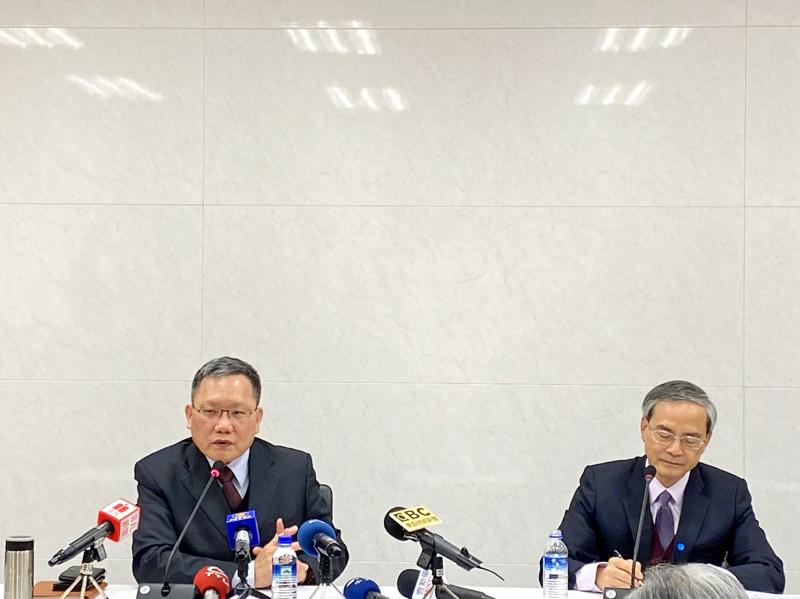The National Stabilization Fund would remain on stand-by to shore up the local bourse until the COVID-19 pandemic has subsided worldwide, Deputy Minister of Finance Frank Juan (阮清華) said yesterday.
Although Taiwan has stopped the virus’ spread, the fund would remain active in light of fragile financial markets across the world, said Juan, the state-run fund’s executive secretary.
The government activated the fund on March 20 after the TAIEX slumped from 12,000 points to 8,600 in a short period amid a panic selloff.

Photo: Wu Chi-lun, Taipei Times
The main board has since recovered, yesterday closing at 10,997.21 points on turnover of NT$180.767 billion (US$6.03 billion), Taiwan Stock Exchange data showed.
“Small and open, the local bourse is susceptible to external shocks,” Juan told a news conference in Taipei, adding that downside risks remain high abroad.
The number of confirmed cases has flattened in Europe and the US, but continues to soar in Latin America and India, he said, adding that the world might not be truly safe until a vaccine is developed.
The fund’s committee would have the final say on whether it should exit the market and when, Juan said, adding that the members also agree that the fund’s actions should be guided by the virus crisis.
The committee is to next meet on July 15, he said.
The fund accumulated NT$47.34 million in unrealized gains as of late March after spending NT$756 million to bolster local shares, Juan said.
The timing of the intervention was more important than the amount of money in achieving stability and the results lend support to that view, he said.

Taiwan Transport and Storage Corp (TTS, 台灣通運倉儲) yesterday unveiled its first electric tractor unit — manufactured by Volvo Trucks — in a ceremony in Taipei, and said the unit would soon be used to transport cement produced by Taiwan Cement Corp (TCC, 台灣水泥). Both TTS and TCC belong to TCC International Holdings Ltd (台泥國際集團). With the electric tractor unit, the Taipei-based cement firm would become the first in Taiwan to use electric vehicles to transport construction materials. TTS chairman Koo Kung-yi (辜公怡), Volvo Trucks vice president of sales and marketing Johan Selven, TCC president Roman Cheng (程耀輝) and Taikoo Motors Group

Among the rows of vibrators, rubber torsos and leather harnesses at a Chinese sex toys exhibition in Shanghai this weekend, the beginnings of an artificial intelligence (AI)-driven shift in the industry quietly pulsed. China manufactures about 70 percent of the world’s sex toys, most of it the “hardware” on display at the fair — whether that be technicolor tentacled dildos or hyper-realistic personalized silicone dolls. Yet smart toys have been rising in popularity for some time. Many major European and US brands already offer tech-enhanced products that can enable long-distance love, monitor well-being and even bring people one step closer to

New apartments in Taiwan’s major cities are getting smaller, while old apartments are increasingly occupied by older people, many of whom live alone, government data showed. The phenomenon has to do with sharpening unaffordable property prices and an aging population, property brokers said. Apartments with one bedroom that are two years old or older have gained a noticeable presence in the nation’s six special municipalities as well as Hsinchu county and city in the past five years, Evertrust Rehouse Co (永慶房產集團) found, citing data from the government’s real-price transaction platform. In Taipei, apartments with one bedroom accounted for 19 percent of deals last

RECORD-BREAKING: TSMC’s net profit last quarter beat market expectations by expanding 8.9% and it was the best first-quarter profit in the chipmaker’s history Taiwan Semiconductor Manufacturing Co (TSMC, 台積電), which counts Nvidia Corp as a key customer, yesterday said that artificial intelligence (AI) server chip revenue is set to more than double this year from last year amid rising demand. The chipmaker expects the growth momentum to continue in the next five years with an annual compound growth rate of 50 percent, TSMC chief executive officer C.C. Wei (魏哲家) told investors yesterday. By 2028, AI chips’ contribution to revenue would climb to about 20 percent from a percentage in the low teens, Wei said. “Almost all the AI innovators are working with TSMC to address the